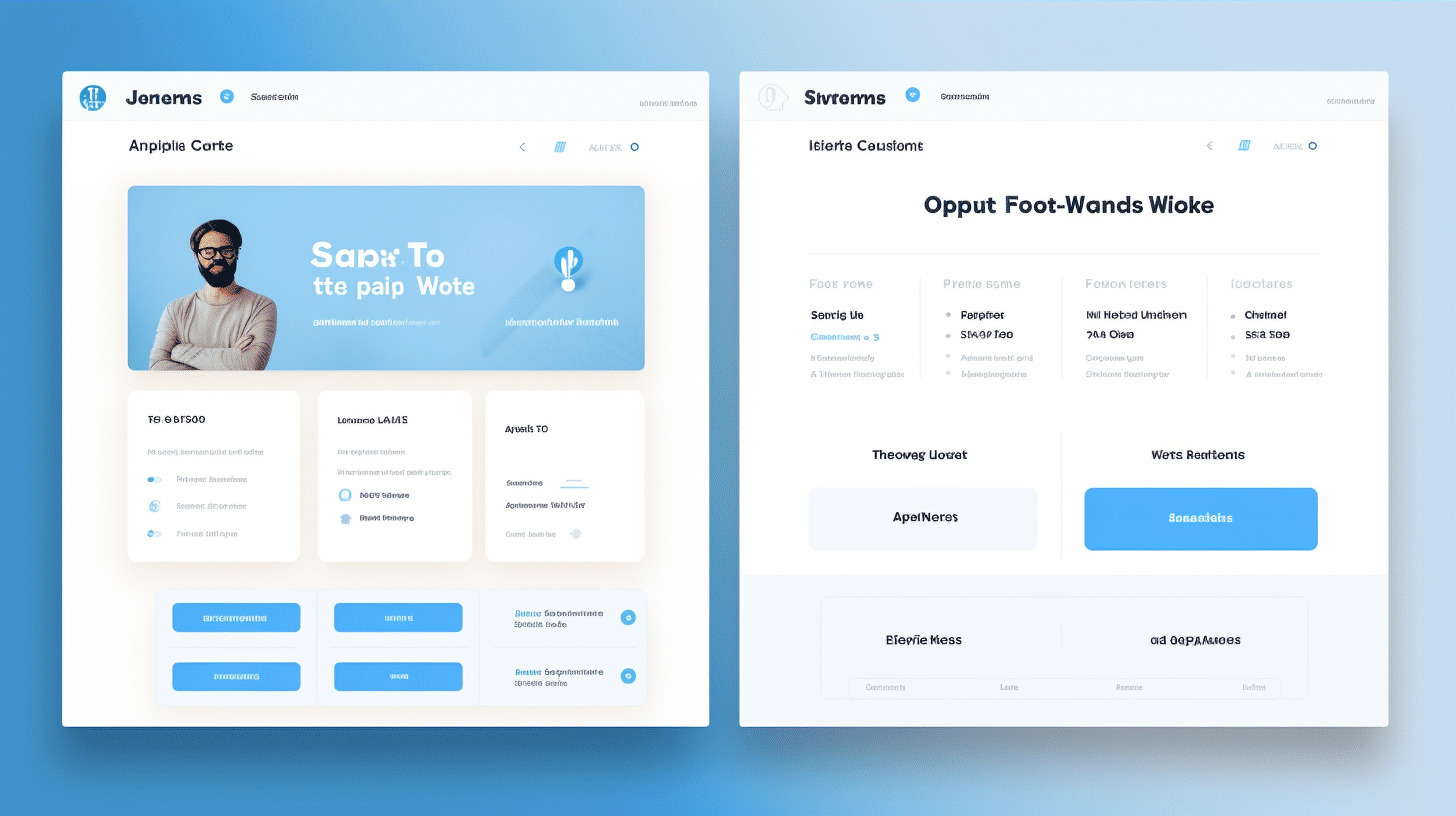您是否希望创建引人入胜且互动的在线学习体验?WordPress 学习管理系统 (LMS) 就是您的最佳选择。无论您是教育工作者、企业家还是培训专业人士,WordPress LMS 都可以改变游戏规则,提供有效的电子学习课程。
在本综合指南中,我们将探索 WordPress LMS 的潜力,并帮助您了解为什么它是创建和管理在线课程的绝佳选择。我们将讨论选择 WordPress LMS 解决方案时要牢记的主要功能、优势和注意事项。此外,我们将比较不同的 WordPress LMS 解决方案,以帮助您做出明智的决定。
那么,让我们一起深入 WordPress LMS 的世界,释放它的潜力吧!🚀
了解 WordPress LMS
📚 学习管理系统 (LMS) 彻底改变了我们的教育和培训方式。随着在线学习的出现,创建和向广大受众提供课程比以往任何时候都更加容易。创建 LMS 的一个流行选择是 WordPress。在本文中,我们将探讨什么是 WordPress LMS,以及它与其他 LMS 平台的区别。
WordPress LMS 的定义
🔍 当我们谈论 WordPress LMS 时,我们指的是基于 WordPress 平台构建的学习管理系统。WordPress 主要被称为用于构建网站和博客的强大而灵活的内容管理系统 (CMS),也可以扩展以创建强大的电子学习平台。
💡 WordPress LMS 将内容管理系统的功能与管理和提供在线课程的能力相结合。它为讲师和学习者提供了用户友好的界面,使创建、管理和跟踪在线课程的进度变得容易。
WordPress LMS 的功能
✨ WordPress LMS 平台具有一系列旨在增强学习体验的功能。一些主要功能包括:
- 课程管理:使用 WordPress LMS,您可以高效地创建和组织课程。这包括添加模块、课程、测验和作业,以及设置课程进度的先决条件。
- 用户管理:LMS 应提供用于管理用户个人资料、注册和进度跟踪的工具。使用 WordPress LMS,您可以轻松管理用户注册、分配角色和权限以及监控用户活动。
- 内容交付:WordPress LMS 允许您以各种格式提供课程内容,包括文本、视频、图像和交互元素。这种灵活性使教师能够创建引人入胜且多媒体丰富的学习材料。
- 评估和反馈:评估学习者的进度是任何 LMS 不可或缺的一部分。WordPress LMS 插件提供测验、考试和作业等评估工具,以及内置评分系统和反馈机制。
- 支付整合:许多 WordPress LMS 插件都与流行的支付网关无缝集成,让您轻松将课程货币化。您可以直接从 WordPress 网站设置定价计划、接受付款和管理订阅。
- 游戏化元素:为了使学习体验更具吸引力和乐趣,WordPress LMS 插件通常包含游戏化功能,如徽章、积分、级别和排行榜。这可以激励学习者并鼓励他们积极参与课程。
- 分析和报告:监控和分析课程表现对于优化课程效果至关重要。WordPress LMS 通常提供内置分析和报告功能,让您可以跟踪学习者的进度、确定需要改进的领域并生成详细报告。
💡 通过利用这些功能,WordPress LMS 可让教育工作者、培训师和企业家轻松创建和提供高质量的在线课程。无论您是独立讲师还是大型组织,WordPress LMS 都能为您提供在在线学习领域取得成功所需的工具。
⚡ 现在我们已经清楚地了解了什么是 WordPress LMS 以及它提供的功能,让我们在本文的后续部分中更深入地了解这些功能如何使不同类型的用户(从讲师到学习者)受益。敬请期待!
为什么使用 WordPress 作为 LMS
您是否想创建一个在线学习平台?WordPress 就是您的最佳选择!WordPress 拥有用户友好的界面和广泛的自定义选项,是构建学习管理系统 (LMS) 的绝佳选择。让我们来探索使用 WordPress 作为 LMS 的优点以及您可以利用这个强大平台的多种不同方式。
WordPress LMS 的优点
在创建 LMS 时,WordPress 具有多项优势,使其脱颖而出。以下是一些主要优势:
- 易于使用:WordPress 以其用户友好的界面而闻名,适合各种技能水平的用户使用。无论您是初学者还是经验丰富的开发人员,您都会发现 WordPress 直观且易于操作。
- 灵活性和定制化:使用 WordPress 作为 LMS 的最大优势之一是它提供的广泛自定义选项。借助数千个主题和插件,您可以定制您的平台以满足您的独特需求和品牌要求。从自定义设计到添加新功能,WordPress 让您可以自由地创建真正个性化的学习体验。
- 可扩展性:随着在线学习平台的发展,可扩展性成为一个关键因素。WordPress 旨在处理各种规模的网站,让您能够随着用户群的扩大而轻松扩展您的 LMS。无论您是小规模起步还是计划大规模发展,WordPress 都能满足您的需求。
- 积极的社区支持:WordPress 拥有庞大而活跃的开发者、设计师和用户社区。这意味着您在创建和优化 LMS 的过程中永远不会孤单。社区提供了广泛的资源、教程和论坛,让您可以轻松找到问题的答案并学习他人的经验。
- SEO友好:搜索引擎优化 (SEO) 在增加网站流量方面起着至关重要的作用。WordPress 本质上是 SEO 友好的,具有内置功能,可帮助优化搜索引擎的内容。通过利用各种 SEO 插件并遵循最佳实践,您可以提高排名并提高在线课程的知名度。
WordPress LMS 的用途和应用
WordPress LMS 可用于各个领域和行业,例如:
- 教育:学校、学院和大学可以使用 WordPress 作为平台来提供在线课程、管理学生入学和跟踪进度。
- 企业培训:许多组织利用 WordPress LMS 提供员工培训和发展计划。它可以轻松跟踪员工的进度和绩效。
- 辅导与咨询:教练和顾问可以通过 WordPress LMS 提供他们的服务,为客户创建一个访问课程材料、参与讨论和获得个性化反馈的空间。
- 会员制社区:WordPress LMS 可用于创建基于会员制的社区,用户可以通过付费来访问独家的教育内容和资源。
- 创业与电子商务:个人和企业可以利用 WordPress LMS 创建和销售在线课程,从而将他们的专业知识货币化。
可以看出,WordPress LMS 的应用非常广泛且多样。它的适应性和多功能性使其适用于不同的行业和用途。
总之,WordPress 是一个功能强大且灵活的平台,可用于构建学习管理系统。WordPress 易于使用、提供自定义选项、可扩展性、提供积极的社区支持,并且具有 SEO 友好性,为创建引人入胜且成功的在线学习平台提供了完美的基础。无论您是教育机构、企业培训组织还是个人企业家,WordPress LMS 都能满足您的需求。那么还等什么呢?利用 WordPress 的强大功能,释放在线教育的巨大潜力!
选择 WordPress LMS 时要考虑的关键因素
您是否正在考虑为您的 WordPress 网站使用学习管理系统 (LMS)?随着在线课程和电子学习的日益普及,找到合适的 LMS 对您的教育事业至关重要。幸运的是,WordPress 提供了大量可供选择的选项,每个选项都有其独特的功能和优势。为了帮助您做出明智的决定,以下是选择 WordPress LMS 时需要考虑的一些关键因素。
易于使用
选择 WordPress LMS 时,务必优先考虑易用性。毕竟,您最不需要的就是一个让您和您的学习者都不知所措的复杂系统。寻找提供用户友好界面和直观导航的 LMS。这将使您更容易设计和管理课程,也使您的学习者更容易访问和参与学习内容。请记住,简单是关键!
与其他工具集成
在当今的数字环境中,集成就是一切。您的 LMS 应该与您用于提供课程或增强学习体验的其他工具和平台无缝集成。以下是一些需要考虑的关键集成:
- 支付网关: 如果您计划在线销售课程,请确保 LMS 与 PayPal、Stripe 或 WooCommerce 等流行的支付网关集成,为您的学习者提供顺畅的结账流程。
- 电子邮件营销服务: 与 MailChimp 或 ConvertKit 等电子邮件营销服务集成,您可以自动化您的营销活动,并让您的学习者参与相关更新和促销活动。
- 内容创建工具: 如果您使用第三方工具(如 Articulate 或 Adobe Captivate)创建课程内容,请确保您的 LMS 支持无缝导入这些格式。
找到一个可以与您现有工具无缝集成的 LMS 将节省您的时间和精力,并提供更好的整体用户体验。
定制选项
使用 WordPress 的优势之一是能够自定义您的网站以匹配您的品牌和独特需求。选择适用于 WordPress 的 LMS 时,请寻找提供充足自定义选项的 LMS。这包括以下功能:
- 品牌: 定制您的 LMS 以匹配您网站的配色方案、徽标和整体品牌,提供有凝聚力和专业的学习者体验。
- 课程布局: 个性化您的课程页面布局,包括课程模块、侧边栏小部件和导航菜单的排列,以适合您的教学风格。
- 附加组件和扩展: 寻找提供各种附加组件和扩展的 LMS,以便您增强课程的功能并根据特定需求进行定制。
通过选择提供自定义选项的 LMS,您可以创建符合您的品牌和教学目标的独特且量身定制的学习体验。
技术支援
无论 LMS 多么方便用户使用,仍可能出现技术问题。因此,考虑 LMS 供应商提供的技术支持水平至关重要。寻找提供以下功能的 LMS 平台:
- 响应支持: 确保供应商及时回复您的疑问并提供多种沟通渠道,例如实时聊天、电子邮件或电话支持。
- 知识库和文档: 在解决常见问题或寻找常见问题的答案时,全面的知识库和详细的文档可以成为宝贵的资源。
- 社区论坛: 强大的社区论坛或用户组可以提供额外的支持,让您与其他 LMS 用户联系,分享经验,并寻求该领域专家的指导。
通过选择具有可靠技术支持的 LMS,您可以确保及时解决任何问题或疑虑,从而最大限度地减少对您的在线学习环境的干扰。
请记住,为您的 WordPress 网站选择合适的 LMS 是一个可以极大地影响您的在线课程成功的决定。通过考虑易用性、与其他工具的集成、自定义选项和技术支持这些关键因素,您就能做出明智的选择。因此,请花点时间评估您的选择,然后选择适合您特定需求和目标的 LMS。祝您电子学习愉快!😊
不同 WordPress LMS 解决方案的比较
在当今的数字时代,在线学习越来越受欢迎,许多教育工作者正在转向学习管理系统 (LMS) 在线提供课程。WordPress 是一种广泛使用的内容管理系统 (CMS),它提供了多种 LMS 解决方案,可以将您的网站转变为引人入胜且互动的在线学习平台。有这么多可用的选项,选择适合您需求的 WordPress LMS 解决方案可能会让人不知所措。在本文中,我们将根据其功能、定价、用户体验以及支持和更新来比较不同的 WordPress LMS 解决方案,以帮助您为您的在线学习事业做出明智的决定。
功能
就功能而言,选择符合您特定要求的 LMS 解决方案至关重要。以下是比较不同的 WordPress LMS 解决方案时需要考虑的一些关键功能的细分:
- 课程创建: 寻找一个提供用户友好界面来创建和管理课程的 LMS 解决方案,包括上传和组织课程材料、创建测验和作业以及跟踪学生进度的能力。
- 内容传递: 考虑一下 LMS 解决方案如何让您提供课程内容。它是否支持视频、音频文件和交互式演示文稿等多媒体内容?您是否可以创建滴灌内容,让学生随着时间的推移可以访问新模块或课程?
- 沟通与协作: 评估 LMS 的通信功能,例如讨论论坛、私人消息和实时聊天。这些功能可以提高学生的参与度并促进学习者之间的协作。
- 评估和评分: 评估学生表现是任何 LMS 的一个关键方面。寻找自动评分、可自定义评估以及提供作业和测验反馈等功能。
- 游戏化和参与度: 一些 LMS 解决方案提供游戏化功能,如徽章、积分、排行榜和证书,以激励和吸引学习者。如果这些功能对您来说很重要,请确保在比较时优先考虑它们。
定价
了解不同 WordPress LMS 解决方案的定价模式对于为您的在线学习平台制定预算至关重要。以下是您可能会遇到的一些常见定价选项:
- 免费插件: 有几款 WordPress LMS 插件可供免费使用,对于预算紧张的用户来说,这是一个很好的起点。但是,它们的功能和可扩展性可能有限。
- 免费增值: 一些 LMS 解决方案提供免费和付费版本。免费版本提供基本功能,而付费版本则提供高级功能和支持(需付费)。
- 基于订阅: 许多 WordPress LMS 解决方案都采用基于订阅的定价模式,您需要按月或按年支付费用才能使用所有功能和更新。价格通常因用户或网站数量等因素而异。
- 一次性付款: 一些 WordPress LMS 解决方案提供一次性付款选项,您只需支付固定费用即可获得终身许可。如果您计划长期使用 LMS,这可能是一种经济实惠的选择。
用户体验
流畅直观的用户体验对于教师和学习者来说都至关重要。在比较不同 WordPress LMS 解决方案的用户体验时,需要考虑以下几个因素:
- 易于使用: LMS 解决方案是否易于使用,界面是否简洁直观?教师是否可以轻松创建和管理课程?学习者是否能够轻松浏览课程材料?
- 移动响应能力: 在当今的移动优先世界中,重要的是确保 LMS 解决方案适合移动设备并在包括智能手机和平板电脑在内的不同设备之间提供无缝体验。
- 可定制性: 寻找允许您自定义在线学习平台外观和布局以匹配您的品牌的 LMS 解决方案。这可以帮助您的课程营造出统一而专业的外观。
支持和更新
拥有可靠的支持和定期更新对于在线学习平台的顺利运行至关重要。在评估不同的 WordPress LMS 解决方案时,请考虑以下几点:
- 客户支持: 检查 LMS 解决方案是否提供及时且响应迅速的客户支持来解决您可能遇到的任何技术问题或疑问。寻找电子邮件支持、实时聊天或专用支持论坛等选项。
- 社区和资源: 强大而活跃的用户社区可以提供宝贵的见解和支持。考虑一下 LMS 解决方案是否有在线论坛或知识库,您可以在其中与其他用户联系并访问有用的资源。
- 更新和维护: 确保您选择的 LMS 解决方案定期收到更新和错误修复,以确保安全性、与 WordPress 的兼容性和增强的功能。
选择正确的 WordPress LMS 解决方案需要仔细考虑功能、定价、用户体验以及支持和更新。通过权衡这些因素,您可以找到满足您独特需求的 LMS 解决方案,并帮助您在在线学习领域取得成功。因此,让我们深入比较不同的 WordPress LMS 解决方案,找到最适合您的解决方案。
选择正确的 WordPress LMS
您是否考虑过为您的 WordPress 网站使用学习管理系统 (LMS)?无论您是希望创建和销售在线课程的个人,还是有兴趣培训员工的公司,找到合适的 WordPress LMS 对于成功的在线学习体验都至关重要。有这么多可用的选项,选择合适的选项可能会让人不知所措。但不要害怕!在本文中,我们将指导您完成选择完美的 WordPress LMS 以满足您独特需求的过程。
确定你的需求
在深入了解 WordPress LMS 插件之前,确定您的具体需求和要求至关重要。通过了解您在 LMS 中寻找的内容,您可以缩小选择范围并选择符合您目标的插件。以下是一些需要考虑的因素:
- 用户界面:导航和使用是否方便?用户友好的界面将为学生和教师带来愉快的学习体验。
- 课程交付:您希望如何授课?考虑一下您是喜欢自定进度学习、现场授课还是两者结合。
- 内容管理:您想如何组织和构建课程内容?寻找可让您轻松创建模块、课程、测验和作业的功能。
- 支付网关集成:您会对课程收费吗?如果会,请确保 LMS 与 PayPal 或 Stripe 等流行支付网关集成。
- 会员及访问控制:您想为课程提供不同级别的访问权限吗?寻找提供会员选项并允许您控制用户访问权限的 LMS 插件。
- 报告和分析:跟踪学生进度并生成报告对您来说有多重要?强大的报告系统可以帮助您监控学习成果并评估课程的有效性。
- 与其他工具集成:您是否使用其他工具,例如电子邮件营销软件或 CRM 系统?考虑一下 LMS 是否与您现有的技术堆栈集成以实现无缝工作流程。
研究
了解了自己的需求后,是时候开始研究市场上可用的各种 WordPress LMS 插件了。列出潜在候选插件,并探索其功能、定价和客户评论。以下是一些可以帮助您的资源:
- WordPress.org:访问官方 WordPress 插件库并搜索 LMS 插件。关注活跃安装数量、平均评分和最近更新频率。
- 在线社区:加入 WordPress 专业人士和教育工作者聚集的在线社区和论坛。向拥有不同 LMS 插件实践经验的人士寻求建议和见解。
- 博客和评论网站:阅读博客文章和评论网站,比较和评估不同的 LMS 插件。寻找公正的意见并考虑来源的可信度。
根据关键因素进行比较
一旦你有了潜在的 WordPress LMS 插件的候选名单,就该根据关键因素对它们进行比较了。这将帮助你做出明智的决定,选择最符合你要求的插件。考虑以下因素:
- 功能:比较每个插件提供的功能,确定它们是否符合您的需求。寻找课程创建、学生注册、进度跟踪和评估工具等功能。
- 易于使用:评估用户界面并确定其是否直观且用户友好。利用免费试用版或演示版来亲身体验插件的易用性。
- 支持和文档:检查插件是否提供可靠的支持渠道,如文档、教程和客户支持。响应迅速的支持团队可以帮助您解决问题并确保顺利运行。
- 定制和灵活性:评估每个插件提供的自定义和灵活性级别。寻找自定义课程外观、添加品牌元素以及与其他插件或主题集成的选项。
- 定价:考虑您的预算并评估每个插件提供的定价计划。寻找定价透明度,包括附加组件或高级支持的任何额外费用。
通过仔细评估这些因素,您将能够顺利选择适合您需求的 WordPress LMS。请记住,选择完美的 LMS 是为您的受众创造引人入胜且有效的在线学习体验的关键一步。因此,请花点时间,进行研究,并做出明智的决定,为您取得成功奠定基础。祝您 LMS 狩猎愉快!🎯📚
结论
总之,选择正确的 WordPress LMS 解决方案对于充分发挥在线学习平台的潜力至关重要。必须考虑易用性、与其他工具的集成、自定义选项和技术支持等因素。通过进行彻底的研究并根据这些关键因素比较不同的选项,您可以找到满足您需求的完美 WordPress LMS 解决方案。
请记住,可靠且强大的托管平台对于 WordPress 网站的无缝运行也至关重要。考虑利用 Managed-WP 的强大功能,这是一个高级托管 WordPress 云托管平台。借助 Managed-WP,您可以简化基础架构,享受创造卓越数字体验的自由,并获得专家全天候解决问题的帮助。使用 Managed-WP 将您的 WordPress 网站提升到新的高度。 在这里查看 Managed-WP.
常见问题
- 什么是 WordPress LMS?
WordPress LMS(学习管理系统)是一个插件或主题,允许您在 WordPress 网站上创建和管理在线课程、提供教育内容、跟踪学生进度并提供互动式学习体验。
- 有哪些顶级的 WordPress LMS 插件可用?
一些流行的 WordPress LMS 插件包括:1. LearnDash、2. LifterLMS、3. Teachable、4. LearnPress 和 5. WP Courseware。
- 选择 WordPress LMS 插件时应该考虑哪些功能?
选择 WordPress LMS 插件时,请考虑课程创建和管理、学生注册和进度跟踪、多媒体支持、评估选项、支付集成、电子商务功能、定制选项以及支持和文档等功能。
- 我可以将 WordPress LMS 与其他插件和工具集成吗?
是的,大多数 WordPress LMS 插件都提供与流行工具和插件的集成,例如用于销售课程的 WooCommerce、用于限制访问的会员插件、用于沟通的电子邮件营销服务以及用于跟踪学生表现的分析工具。
- 我需要编码知识才能使用 WordPress LMS 插件吗?
不,您不需要编码知识即可使用 WordPress LMS 插件。这些插件设计为用户友好型,允许您通过可视化界面创建和管理课程、设置评估以及跟踪学生进度。



















